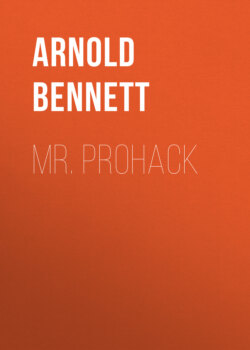Читать книгу Mr. Prohack - Arnold Bennett - Страница 29
На сайте Литреса книга снята с продажи.
II
ОглавлениеTable of Contents
Mr. Prohack's son was, in some respects, a great mystery to him. He could not understand, for instance, how his own offspring could be so unresponsive to the attractions of the things of the mind, and so interested in mere machinery and the methods of moving a living or a lifeless object from one spot on the earth's surface to another. Mr. Prohack admitted the necessity of machinery, but an automobile had for him the same status as a child's scooter and no higher. It was an ingenious device for locomotion. And there for him the matter ended. On the other hand, Mr. Prohack sympathised with and comprehended his son's general attitude towards life. Charlie had gone to war from Cambridge at the age of nineteen. He went a boy, and returned a grave man. He went thoughtless and light-hearted, and returned full of magnificent and austere ideals. Six months of England had destroyed these ideals in him. He had expected to help in the common task of making heaven in about a fortnight. In the war he had learnt much about the possibilities of human nature, but scarcely anything about its limitations. His father tried to warn him, but of course failed. Charlie grew resentful, then cynical. He saw in England nothing but futility, injustice and ingratitude. He refused to resume Cambridge, and was bitterly sarcastic about the generosity of a nation which, through its War Office, was ready to pay to studious warriors anxious to make up University terms lost in a holy war decidedly less than it paid to its street-sweepers. Having escaped from death, the aforesaid warriors were granted the right to starve their bodies while improving their minds. He might have had sure situations in vast corporations. He declined them. He spat on them. He called them "graves." What he wanted was an opportunity to fulfil himself. He could not get it, and his father could not get it from him. While searching for it, he frequently met warriors covered with ribbons but lacking food and shelter not only for themselves but for their women and children. All this, human nature being what it is, was inevitable, but his father could not convincingly tell him so. All that Mr. Prohack could effectively do Mr. Prohack did—namely, provide the saviour of Britain with food and shelter. Charlie was restlessly and dangerously waiting for his opportunity. But he had not developed into a revolutionist, nor a communist, nor anything of the sort. Oh, no! Quite the reverse. He meditated a different revenge on society.
Mr. Prohack knew nothing of this meditated revenge, did not suspect it. If he had suspected it, he might have felt less compassion than, on this masculine evening with the unusual port, he did in fact feel. For he was very sorry for Charlie. He longed to tell him about the fortune, and to exult with him in the fortune, and to pour, as it were, the fortune into his lap. He did not care a fig, now, about advisable precautions. He did not feel the slightest constraint at the prospect of imparting the tremendous and gorgeous news to his son. He had no desire to reflect upon the proper method of telling. He merely and acutely wanted to tell, so that he might see the relief and the joyous anticipation on his son's enigmatic and melancholy face. But he could not tell because it had been tacitly agreed with his wife that he should not tell in her absence. True, he had given no verbal promise, but he had given something just as binding.
"Nothing exciting to-day, I suppose," he said, when the silence had begun to distress him in his secret glee.
"No," Charlie replied. "I got particulars of an affair at Glasgow, but it needs money."
"What sort of an affair?"
"Oh! Rather difficult to explain. Buying and selling. Usual thing."
"What money is needed?"
"I should say three hundred or thereabouts. Might as well be three thousand so far as I'm concerned."
"Where did you hear of it?"
"Club."
Charlie belonged to a little club in Savile Place where young warriors told each other what they thought of the nature of society.
Mr. Prohack drew in his breath with an involuntary gasp, and then said:
"I expect I could let you have three hundred."
"You couldn't!"
"I expect I could." Mr. Prohack had never felt so akin to a god. It seemed to him that he was engaged in the act of creating a future, yea, a man. Charlie's face changed. He had been dead. He was now suddenly alive.
"When?"
"Well, any time."
"Now?"
"Why not?"
Charlie looked at his watch.
"Well, I'm much obliged," he said.
